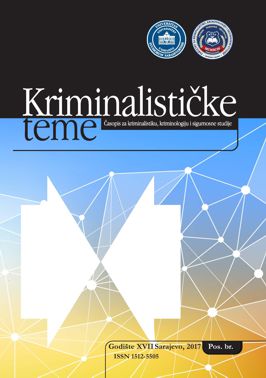KLASIFIKACIJA MALICIOZNIH AKTIVNOSTI U SAJBER PROSTORU I ORGANIZACIJA SAJBER BEZBEDNOSTI U REPUBLICI SRBIJI
CLASSIFICATION OF MALICIOUS ACTIVITIES IN CYBERSPACE AND ORGANIZATION OF CYBER SECURITY IN SERBIA
Author(s): Milan Milošević, Goran Matić, Milan MiljkovićSubject(s): Security and defense, Criminology, ICT Information and Communications Technologies
Published by: Fakultet za kriminalistiku, kriminologiju i sigurnosne studije Univerziteta u Sarajevu
Keywords: cyber crime; cyber espionage; crisis management in cyber security;
Summary/Abstract: Reason for writing and research problem (s): Many years of professional research of malicious cyber activity and the state of cybersecurity in the Republic of Serbia. Aims of the paper (scientific and/ or social): Concerned paper had the goal to contribute to the definition and classification of malicious activity in cyberspace, as well as to carry out a comparative analysis of cybersecurity system in the Republic of Serbia in relation to modern international standards in this area. Methodology/ Design: In the paper, among others, the legal dogmatic, analytical and comparative method had been used. Research/ Paper limitations: Presentation of the problem of cybersecurity organizations in the Republic of Serbia is limited to the presentation of the legal and organizational aspects of this issue. Results/Findings: It turned out that the origin of cyber incidents may vary, which means that they may be motivated by criminal or political factors, derived from terrorism, as well as sponsored by some states with a view of achieving particular economic, political, military and national security objectives. This work sets out a proposal for a definition that implies the following: a cyber attack must involve active behavior of the perpetrator; must aim to jeopardize the functioning of the victim’s computer network and be carried out with the aim of achieving a political or national security goal. Also, in terms of organization, we identified that crisis management in cybersecurity includesthe coordination of the entire cyber policy at the state level, through the body responsible for coordinating national security policy. General conclusion: Cyberspace is becoming more domains for carrying out criminal activities, which actualize the need for the international community to coordinate views on the classification of malicious activity in cyberspace. The definition of cyberattacks, which is offered in work, promoting an approach based on “purpose” of the attack, and can help differentiate cyber-crime from cyber-attacks. In addition, it offered a theoretical framework for the classification of types of intelligence activities in cyberspace. It should be noted that the concept of cybersecurity in each country hasits political, regulatory, organizational and institutional aspects.
Journal: Kriminalističke teme – Časopis za kriminalistiku, kriminologiju i sigurnosne studije
- Issue Year: XVII/2017
- Issue No: 5
- Page Range: 540-553
- Page Count: 14
- Language: Bosnian, Croatian, Serbian

